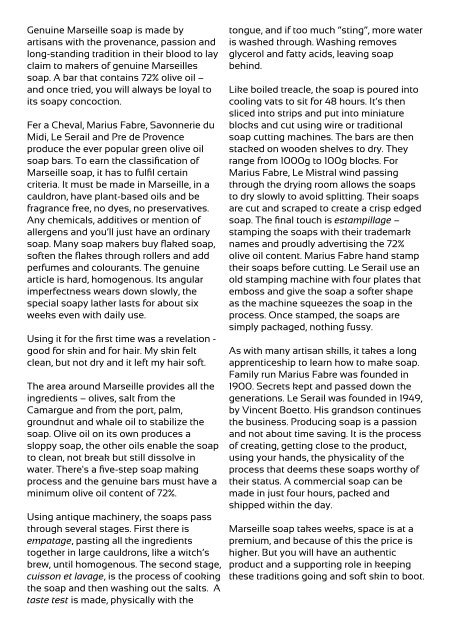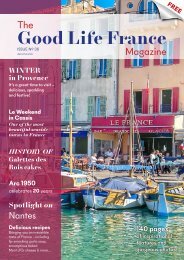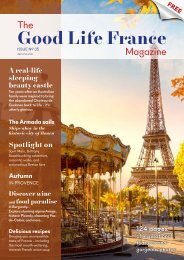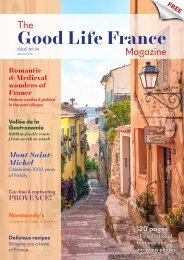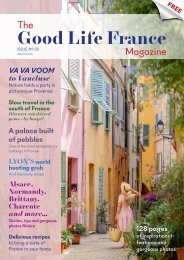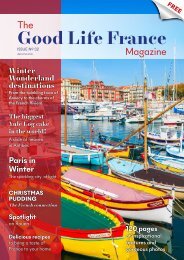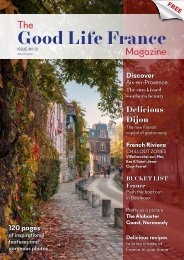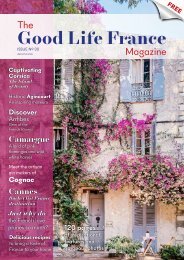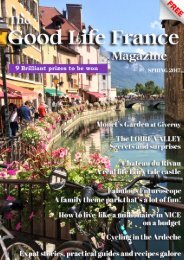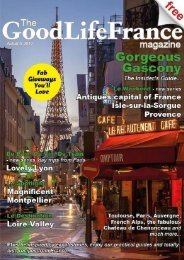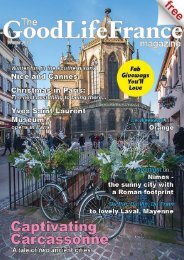Issue No. 20
Inspiring, tempting and gorgeous, this issue is packed with destination features - Chartres with its gothic cathedral, the French Riviera, the Chateau d'Azay-le-Rideau, the Tarn region, Valence - gateway to the south and more. Mouth-watering recipes, plus useful guides for those dreaming of living in France...
Inspiring, tempting and gorgeous, this issue is packed with destination features - Chartres with its gothic cathedral, the French Riviera, the Chateau d'Azay-le-Rideau, the Tarn region, Valence - gateway to the south and more. Mouth-watering recipes, plus useful guides for those dreaming of living in France...
- No tags were found...
Create successful ePaper yourself
Turn your PDF publications into a flip-book with our unique Google optimized e-Paper software.
Genuine Marseille soap is made by<br />
artisans with the provenance, passion and<br />
long-standing tradition in their blood to lay<br />
claim to makers of genuine Marseilles<br />
soap. A bar that contains 72% olive oil –<br />
and once tried, you will always be loyal to<br />
its soapy concoction.<br />
Fer a Cheval, Marius Fabre, Savonnerie du<br />
Midi, Le Serail and Pre de Provence<br />
produce the ever popular green olive oil<br />
soap bars. To earn the classification of<br />
Marseille soap, it has to fulfil certain<br />
criteria. It must be made in Marseille, in a<br />
cauldron, have plant-based oils and be<br />
fragrance free, no dyes, no preservatives.<br />
Any chemicals, additives or mention of<br />
allergens and you’ll just have an ordinary<br />
soap. Many soap makers buy flaked soap,<br />
soften the flakes through rollers and add<br />
perfumes and colourants. The genuine<br />
article is hard, homogenous. Its angular<br />
imperfectness wears down slowly, the<br />
special soapy lather lasts for about six<br />
weeks even with daily use.<br />
Using it for the first time was a revelation -<br />
good for skin and for hair. My skin felt<br />
clean, but not dry and it left my hair soft.<br />
The area around Marseille provides all the<br />
ingredients – olives, salt from the<br />
Camargue and from the port, palm,<br />
groundnut and whale oil to stabilize the<br />
soap. Olive oil on its own produces a<br />
sloppy soap, the other oils enable the soap<br />
to clean, not break but still dissolve in<br />
water. There's a five-step soap making<br />
process and the genuine bars must have a<br />
minimum olive oil content of 72%.<br />
Using antique machinery, the soaps pass<br />
through several stages. First there is<br />
empatage, pasting all the ingredients<br />
together in large cauldrons, like a witch’s<br />
brew, until homogenous. The second stage,<br />
cuisson et lavage, is the process of cooking<br />
the soap and then washing out the salts. A<br />
taste test is made, physically with the<br />
tongue, and if too much “sting”, more water<br />
is washed through. Washing removes<br />
glycerol and fatty acids, leaving soap<br />
behind.<br />
Like boiled treacle, the soap is poured into<br />
cooling vats to sit for 48 hours. It’s then<br />
sliced into strips and put into miniature<br />
blocks and cut using wire or traditional<br />
soap cutting machines. The bars are then<br />
stacked on wooden shelves to dry. They<br />
range from 1000g to 100g blocks. For<br />
Marius Fabre, Le Mistral wind passing<br />
through the drying room allows the soaps<br />
to dry slowly to avoid splitting. Their soaps<br />
are cut and scraped to create a crisp edged<br />
soap. The final touch is estampillage –<br />
stamping the soaps with their trademark<br />
names and proudly advertising the 72%<br />
olive oil content. Marius Fabre hand stamp<br />
their soaps before cutting. Le Serail use an<br />
old stamping machine with four plates that<br />
emboss and give the soap a softer shape<br />
as the machine squeezes the soap in the<br />
process. Once stamped, the soaps are<br />
simply packaged, nothing fussy.<br />
As with many artisan skills, it takes a long<br />
apprenticeship to learn how to make soap.<br />
Family run Marius Fabre was founded in<br />
1900. Secrets kept and passed down the<br />
generations. Le Serail was founded in 1949,<br />
by Vincent Boetto. His grandson continues<br />
the business. Producing soap is a passion<br />
and not about time saving. It is the process<br />
of creating, getting close to the product,<br />
using your hands, the physicality of the<br />
process that deems these soaps worthy of<br />
their status. A commercial soap can be<br />
made in just four hours, packed and<br />
shipped within the day.<br />
Marseille soap takes weeks, space is at a<br />
premium, and because of this the price is<br />
higher. But you will have an authentic<br />
product and a supporting role in keeping<br />
these traditions going and soft skin to boot.


